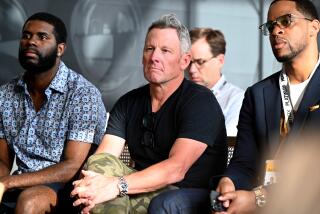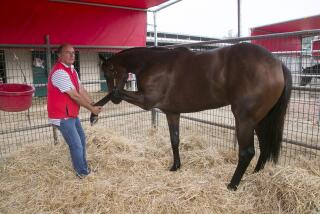Alberto Contador’s test result a new setback for cycling
- Share via
Current Tour de France champion Alberto Contador has tested positive for a banned stimulant. Seven-time champion Lance Armstrong is a central figure in a federal grand jury probe of drug use in the sport. And 2006 champion Floyd Landis has confessed to performance-enhancing drug use when he won.
So, why should we should care about professional cycling?
“No cycling fan, sponsor, or race organizer can credibly argue that the sport has not been corrupted to the point where it lacks credibility,” said David M. Carter, principal of the Sports Business Group, a marketing firm. “What was once one of the greatest global sports has been reduced to the point that everyone must wait for two sets of results prior to crowning a champion — who wins on the course and who avoids losing off it.”
Contador’s positive test for the asthma-relieving clenbuterol was said to be a small amount by the international cycling organization that supervises the sport. At a news conference Thursday in his hometown of Pinto, Spain, the three-time champion speculated the positive result came from a contaminated steak.
A Spanish friend of Contador’s apparently brought the beef to Contador in France. A Dutch doctor who has consulted with Contador’s attorney has explained that cattle sometimes are illegally given clenbuterol to make them grow bigger.
The amount doesn’t matter to the World Anti-Doping Agency, which has clenbuterol on its banned list. Contador could be stripped of his title if WADA and cycling investigators rule that the rider knowingly took the performance-enhancing drug.
At his news conference, Contador claimed he was the victim in the scandal. He tested positive at a key stage of the Tour on July 21 and was informed of the positive test Aug. 24 after he was hailed in the traditional yellow jersey on the Champs-Elysees beneath the Arc de Triomphe at the end of the Tour.
A bad slice of steak — or something far worse — has changed everything.
“If this case had been solved internally, the image of our sport wouldn’t have been damaged,” Contador said at the news conference. “This is an authentic mistake. But at the end, it’s best that everyone finds out. It’s sad that a sport like ours and sports in general are exposed to scandals like this one because of these regulations.”
Yet, post-Landis, and with the cycling grand jury at work, cycling’s image — Landis and Armstrong were teammates, Armstrong and Contador were teammates — has taken another wrecking-ball hit.
“If people are still trying to beat the system after all the sport’s been through, that’s a shame,” said Frankie Andreu, a commentator for the cable network Versus, which televises the Tour.
“This Tour was a great competition. It’s a beautiful sport, the speeds are incredible, it’s a true test of endurance; a lot of tactics and strategy. Most riders are doing it clean, and we had compelling action with the crashes and head-butting. It was like a soap opera every day. Ideally, I’d like to have the drug element of the soap opera removed.”
So would those financially backing the sport, to the tune of $15 million for some Tour teams.
A spokeswoman for Versus declined to comment when asked about the network’s plans to continue televising the Tour beyond its current deal that runs through 2013.
“Sponsors that remain actively engaged must believe that their brands will not be [further] compromised by the perceived prevalence of performance-enhancing drugs,” Carter said. “Sponsors must work very hard to ensure that their credibility is not dismissed as readily as so many associated with the sport. However, sponsors must be concerned that some fans and consumers could very well take the position that the sponsors are complicit in the process because they continue to fund the sport.”
The investors are keenly aware cycling has the potential to draw interest from the average sports fan and recreational athlete. An estimated 57 million American adults ride bicycles, according to a National Highway Traffic Safety Administration study, and Andy Clarke, president of the League of American Bicyclists, said the bicycle industry reports sales of 15 to 20 million new units per year.
Steve Johnson, the chief executive of USA Cycling, said membership and racing activity in his organization have increased in the last year even as scandals have raged.
“When the stakes are high, human nature can kick in, but I believe our sport is doing a lot of stuff that other sports aren’t,” Johnson said.
“Humans take risks. There’ll always be cheaters. We feel we’ll always be there to catch them.”
Jonathan Vaughters, manager of the 28-rider Garmin-Transitions team who’s presided over three Tour de France teams, is an anti-doping advocate who retains his own independent testing program. He said while he thinks the Contador case requires further investigation, it illustrates a point he believes cycling sponsors find appetizing.
“When you invest massive resources into a drug-testing program and equipment, it catches everything,” Vaughters said. “The sensitive testing in our sport did its job. I want the testing to be this good. This case would not happen in most sports. We’re pursuing true sport. The volume and [ethic] of testing in this sport makes it abundantly transparent. I believe we’re focused on beating this stuff.”
“If I’m a sponsor of this sport, I believe I’m interested in real integrity, not a facade. Sponsors should want this kind of testing that creates real sport and genuine results. It’s the best way forward, showing this is the most enforced sport in the world.”
Andreu has been cooperating with a Los Angeles grand jury as it looks into allegations of systematic doping in cycling. He often repeats his account that he overheard Armstrong tell cancer doctors in 1996 that he had previously used performance-enhancing drugs. But he says cycling’s current trials are no different from baseball’s steroid crisis last decade and the occasional PED suspensions in the NFL.
“Do we stop putting baseball and football on TV? Every sport has these things,” Andreu said. “You can’t pull the plug on a sport just because one big name tried to cheat the sport. There’s been progress. There’s a lot fewer cheats.
“Alberto’s test has thrown a monkey wrench into all of the plans. It will cause a lot of confusion. But most riders are doing this clean. This sport is about surviving, enduring, and I believe it will endure.”
Twitter.com/latimespugmire
More to Read
Go beyond the scoreboard
Get the latest on L.A.'s teams in the daily Sports Report newsletter.
You may occasionally receive promotional content from the Los Angeles Times.











